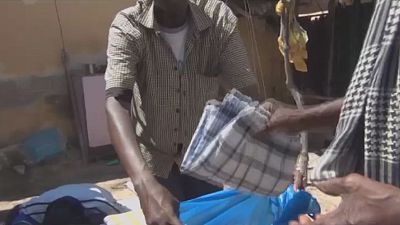Somalia
As cheap foreign imports flood the markets, Somalia’s traditional textile industry is in the brink of extinction. Few craftsmen are however keeping the tradition alive as the beautiful garments struggle to remain fashionable among Somalis.
Mohamed Nur a local craftsman says: “I have been working for 21 years; I learnt this skill from my father. I would like to keep working in this skill”
Traditional clothes had a glory time in the country, when old and young Somalis took pride dressing up in the traditional clothes, but not now when the markets have been taken over by cheaper imported alternatives.
But as they say, cheap is expensive as Mohamed Nur says.
“These clothes last for a long time while the other clothes imported from abroad turn out quickly. The clothes I’m clad in are traditional. Even the turban wrapped on my head is hand made.“
Older people comprise of the biggest number of Somalis that still consider buying the durable handmade traditional clothes in Somalia. But young people consider the the clothes locally known as Al-Hindi as old fashion.
“There is a big difference between the traditional clothes and other clothes, they can last for over three years while the imported clothes get done after about 8 months,” says Haji Duqow, a client.
Abdullahi Mohamed, another craftsman says: “I learnt this skill 21 years ago and became well versed, but owing to lack of modern equipment, we used primitive tools. We can only produce 3 items per day and the jobs is very exhausting.”
As the local textile industry struggles to overcome these obstacles, not much is being done from the government side to fully revive the craft or inspire more African designs into the local markets.














Go to video
Exhibition in Morocco explores a world of color
Go to video
Somalia launches national voter registration campaign
Go to video
Discover Cape Verde’s vibrant music scene at the Atlantic Music Expo
Go to video
Uncertainty as US alters emergency food aid strategies in Somalia
Go to video
Morocco: How traditional clothing enhances the Eid festivities
Go to video
A restored ancient museum palace showcases treasures from the Islamic world